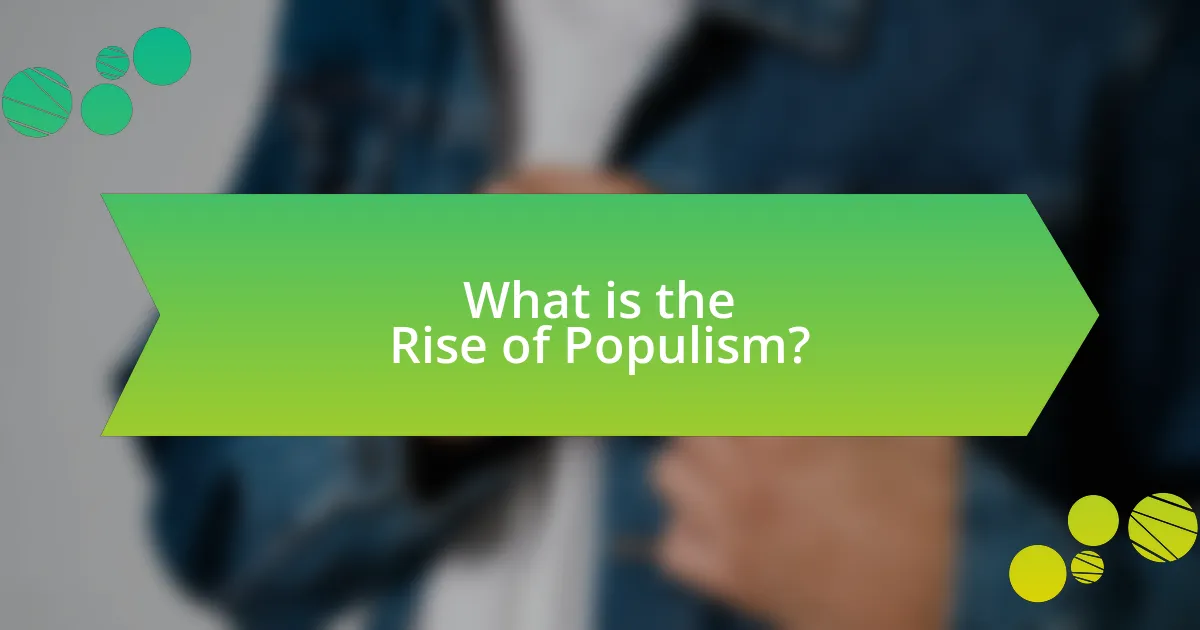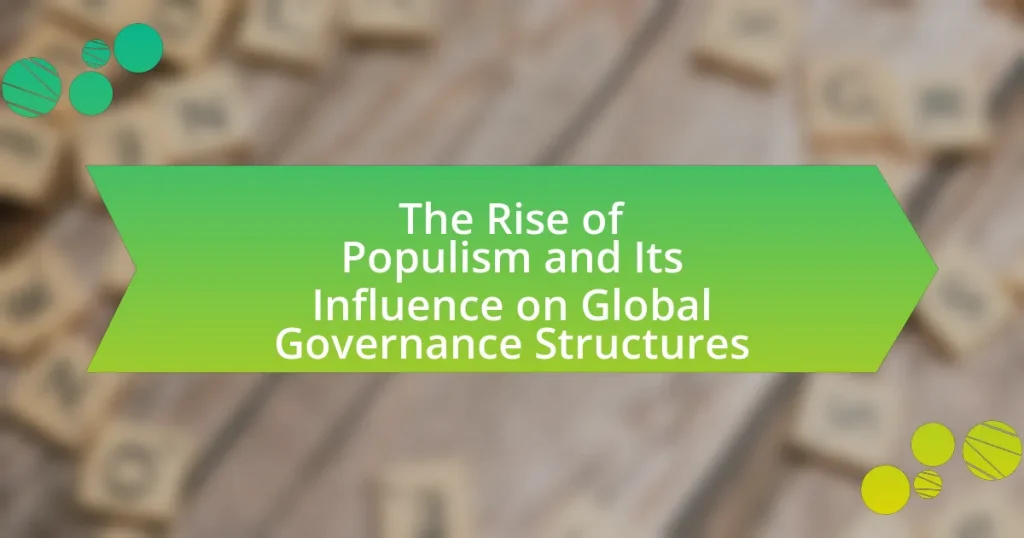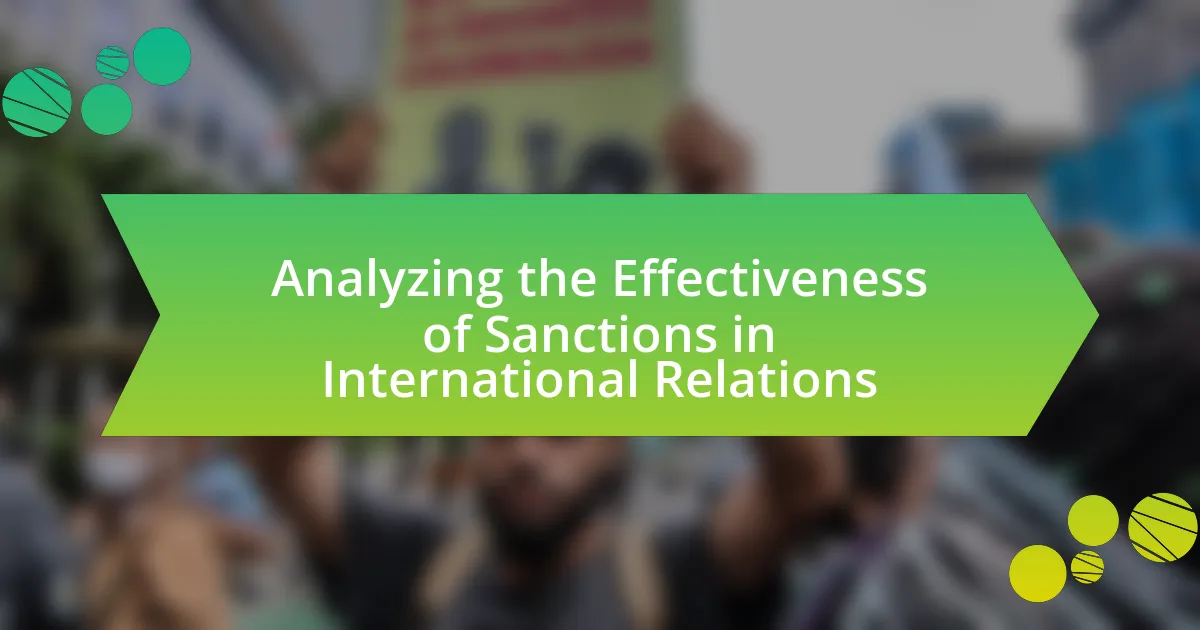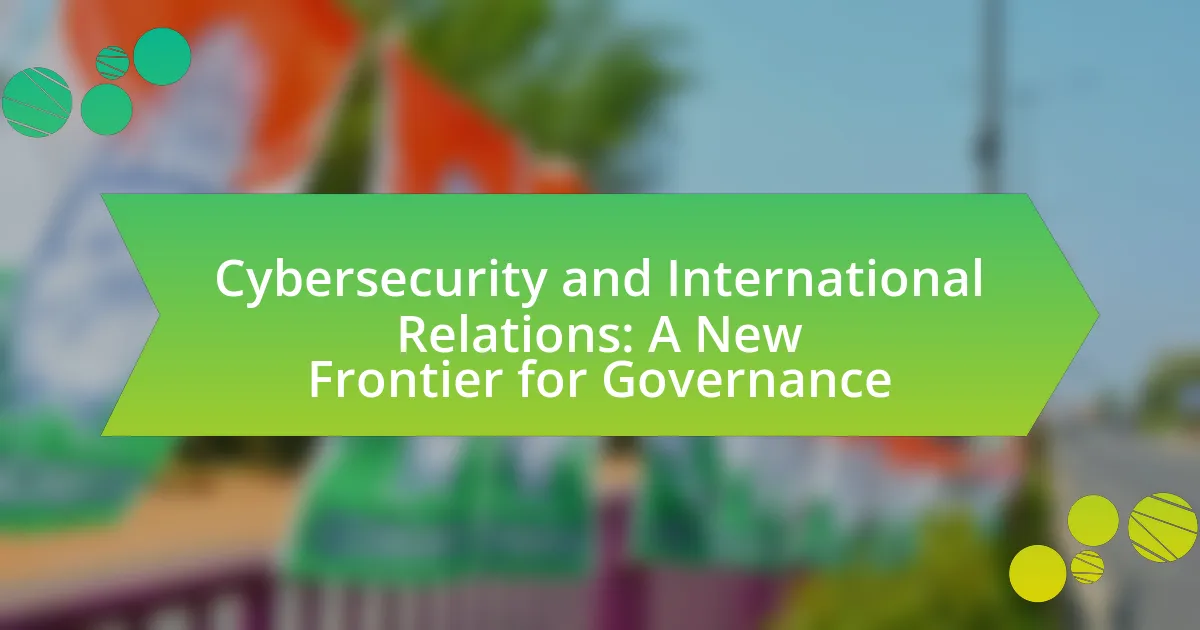The rise of populism is a significant political movement characterized by leaders who claim to represent the interests of the “common people” against the elite. This phenomenon has gained momentum globally, particularly in the last two decades, driven by factors such as economic inequality, cultural backlash, and dissatisfaction with traditional political parties. The article explores the evolution of populism, its historical influences, key characteristics, and its implications for global governance structures. It highlights how populism challenges established political norms, affects international relations, and reshapes economic policies, while also discussing strategies to address its challenges and the potential future trajectory of populist movements.

What is the Rise of Populism?
The rise of populism refers to the increasing political movement characterized by leaders who claim to represent the “common people” against the elite or establishment. This phenomenon has gained traction globally, particularly in the last two decades, as evidenced by the electoral successes of populist leaders in various countries, such as Donald Trump in the United States and Jair Bolsonaro in Brazil. Research indicates that economic inequality, cultural backlash, and dissatisfaction with traditional political parties have fueled this trend, leading to significant shifts in governance and policy-making. For instance, a study by Cas Mudde and Cristóbal Rovira Kaltwasser highlights that populism often emerges in response to perceived failures of liberal democracy, challenging established political norms and institutions.
How has populism evolved over the years?
Populism has evolved from a primarily agrarian movement in the late 19th century to a multifaceted political approach that now encompasses various ideologies and social classes. Initially, populism emerged in the United States with the People’s Party, advocating for the rights of farmers against industrial elites. Over the decades, it has transformed, particularly in the late 20th and early 21st centuries, as leaders like Hugo Chávez in Venezuela and Donald Trump in the U.S. utilized populist rhetoric to mobilize support by appealing to the frustrations of the working and middle classes against perceived political corruption and economic inequality. This evolution reflects a shift from traditional left-right political divides to a more complex landscape where populism can be found across the political spectrum, often characterized by anti-establishment sentiments and a focus on national sovereignty. The rise of digital media has further amplified populist messages, allowing leaders to bypass traditional media and connect directly with their supporters, thereby reshaping global governance structures by challenging established political norms and institutions.
What historical events contributed to the rise of populism?
The rise of populism has been significantly influenced by several historical events, including the economic crises of the late 19th and early 20th centuries, the Great Depression of the 1930s, and the financial crisis of 2008. Economic instability often leads to disillusionment with traditional political parties, prompting the emergence of populist movements that claim to represent the “common people” against the elite. For instance, the Great Depression saw the rise of leaders like Franklin D. Roosevelt in the United States, who utilized populist rhetoric to gain support for New Deal policies aimed at economic recovery. Similarly, the 2008 financial crisis resulted in a surge of populist sentiments across various countries, as many citizens felt abandoned by their governments and financial institutions, leading to the rise of figures such as Donald Trump in the U.S. and movements like Brexit in the U.K. These events illustrate how economic turmoil can catalyze populist movements by fostering a sense of urgency and a desire for change among the populace.
How do cultural and economic factors influence populism?
Cultural and economic factors significantly influence populism by shaping public sentiment and political narratives. Economic instability, such as high unemployment rates or income inequality, often leads to discontent among the populace, making them more receptive to populist messages that promise to address their grievances. For instance, during the 2008 financial crisis, many countries experienced a surge in populist movements as economic hardships intensified.
Culturally, factors such as national identity, immigration, and social values can also drive populism. Populist leaders often exploit cultural anxieties, portraying themselves as defenders of the “common people” against perceived threats from elites or outsiders. In countries like Hungary and Poland, populist parties have gained traction by emphasizing national sovereignty and traditional values in response to globalization and immigration pressures.
These dynamics illustrate how intertwined cultural and economic factors create fertile ground for populist ideologies to flourish, as they resonate with the fears and aspirations of the electorate.
What are the key characteristics of populist movements?
Populist movements are characterized by their appeal to the common people against the elite, emphasizing a dichotomy between “the people” and “the elite.” These movements often utilize charismatic leadership, mobilizing grassroots support through emotional rhetoric and simplified messages that resonate with widespread grievances. For instance, leaders like Donald Trump in the United States and Jair Bolsonaro in Brazil have effectively harnessed populist sentiments by portraying themselves as champions of the ordinary citizen against corrupt political establishments. Additionally, populist movements frequently advocate for nationalism and protectionism, rejecting globalization and promoting policies that prioritize domestic interests. This is evident in the rise of parties such as the National Front in France, which has capitalized on anti-immigrant sentiments and economic discontent.
How do populist leaders communicate with their followers?
Populist leaders communicate with their followers primarily through direct, emotive language that resonates with their audience’s concerns and aspirations. They often utilize social media platforms to bypass traditional media, allowing for unfiltered messages that create a sense of personal connection. For instance, leaders like Donald Trump and Jair Bolsonaro have effectively used Twitter and Facebook to engage directly with supporters, fostering a community that feels heard and validated. This approach is supported by research indicating that populist rhetoric often simplifies complex issues, framing them in a way that emphasizes a dichotomy between “the people” and “the elite,” which enhances relatability and mobilizes support.
What role does nationalism play in populist ideologies?
Nationalism serves as a foundational element in populist ideologies by fostering a sense of identity and unity among the populace, often positioning the “common people” against perceived elites or outsiders. This connection is evident in various populist movements worldwide, where leaders invoke national pride and cultural heritage to galvanize support. For instance, in the United States, the rise of populism during the 2016 presidential election was marked by a strong nationalist rhetoric that emphasized “America First,” appealing to voters’ desires for economic protectionism and cultural preservation. This alignment of nationalism with populist sentiments is further supported by research indicating that nationalist narratives can effectively mobilize public sentiment, as seen in studies analyzing the electoral success of populist parties in Europe, where anti-immigration and sovereignty-focused messages resonate with voters facing economic uncertainty.
Why is understanding populism important for global governance?
Understanding populism is important for global governance because it shapes political dynamics and influences policy-making on an international scale. Populism often arises in response to perceived failures of traditional political systems, leading to shifts in power that can disrupt established governance structures. For instance, the rise of populist leaders in various countries has resulted in significant changes in foreign policy, trade agreements, and international cooperation, as seen in the United States under Donald Trump and in Brazil under Jair Bolsonaro. These changes can challenge multilateralism and affect global stability, making it crucial for global governance frameworks to adapt to these emerging populist sentiments.
How does populism challenge traditional political structures?
Populism challenges traditional political structures by promoting a direct connection between leaders and the general populace, often bypassing established political institutions. This phenomenon disrupts the status quo by undermining the authority of political elites and established parties, as seen in various countries where populist movements have gained traction, such as the rise of Donald Trump in the United States and Jair Bolsonaro in Brazil. These leaders often frame their rhetoric around the idea of representing “the people” against a corrupt elite, which can lead to the erosion of institutional checks and balances. For instance, Trump’s administration frequently criticized the media and judiciary, labeling them as part of the elite establishment, which weakened public trust in these institutions. This shift can result in significant changes to governance, as populist leaders may prioritize their agenda over traditional democratic processes, leading to potential authoritarianism or the destabilization of democratic norms.
What implications does populism have for democratic processes?
Populism can undermine democratic processes by fostering polarization and eroding trust in institutions. This occurs as populist leaders often position themselves against established political elites, claiming to represent the “true” will of the people, which can lead to a delegitimization of democratic norms and institutions. For instance, in Hungary, Prime Minister Viktor Orbán’s government has implemented measures that weaken judicial independence and media freedom, illustrating how populism can disrupt the checks and balances essential for democracy. Additionally, populism may encourage majoritarianism, where the rights of minority groups are overlooked, further threatening democratic principles.

How does Populism Influence Global Governance Structures?
Populism influences global governance structures by challenging established political norms and promoting nationalist agendas that prioritize the interests of the “common people” over international cooperation. This shift often leads to a decline in multilateralism, as populist leaders may withdraw from international agreements or organizations, arguing that they undermine national sovereignty. For instance, the United States’ withdrawal from the Paris Agreement under President Trump exemplifies how populist rhetoric can disrupt global climate governance. Additionally, populist movements tend to foster skepticism towards global institutions, which can result in weakened collaborative efforts on issues like trade, security, and human rights, as seen in the rise of anti-globalization sentiments in various countries.
What are the main ways populism affects international relations?
Populism primarily affects international relations through the promotion of nationalism, the undermining of multilateralism, and the alteration of diplomatic norms. Nationalism, driven by populist leaders, often leads to prioritizing domestic interests over international cooperation, as seen in the United States under Donald Trump’s “America First” policy, which resulted in withdrawal from international agreements like the Paris Climate Accord. This shift undermines multilateralism, as populist governments frequently reject collaborative frameworks, opting instead for bilateral agreements that favor their own agendas. Additionally, populism alters diplomatic norms by fostering a confrontational approach to foreign policy, exemplified by the rise of populist leaders who engage in aggressive rhetoric and policies, such as Hungary’s Viktor Orbán, who has challenged EU norms and values. These dynamics collectively reshape the landscape of international relations, leading to increased tensions and a fragmented global order.
How do populist governments approach foreign policy?
Populist governments typically approach foreign policy with a focus on nationalism and prioritizing the interests of their own citizens over international cooperation. This approach often manifests in skepticism towards multilateral agreements and institutions, as seen in the withdrawal of the United States from the Paris Agreement under President Trump, which was justified by a populist narrative emphasizing American sovereignty and economic interests. Additionally, populist leaders may engage in bilateral negotiations that favor their domestic agendas, reflecting a tendency to view foreign relations through a lens of direct benefit to their electorate. This strategy can lead to strained relationships with traditional allies and a preference for partnerships with authoritarian regimes that align with their populist ideologies, such as the close ties between Hungary’s Viktor Orbán and Russia’s Vladimir Putin.
What impact does populism have on international cooperation?
Populism negatively impacts international cooperation by fostering nationalism and undermining multilateral agreements. Populist leaders often prioritize domestic interests over global collaboration, leading to withdrawal from international treaties, as seen with the United States’ exit from the Paris Agreement under President Trump. This shift creates barriers to collective action on global issues such as climate change and trade, as countries become more focused on unilateral policies rather than cooperative solutions. The rise of populism has also been linked to increased skepticism towards international organizations, further eroding trust and collaboration among nations.
How does populism reshape global economic policies?
Populism reshapes global economic policies by prioritizing national interests over international cooperation, leading to protectionist measures and a shift towards economic nationalism. This trend is evident in the rise of leaders who advocate for tariffs, trade barriers, and the renegotiation of trade agreements, as seen in the United States under the Trump administration, which withdrew from the Trans-Pacific Partnership and imposed tariffs on various imports. Such actions disrupt established global trade norms and can lead to retaliatory measures from other nations, further complicating international economic relations. Additionally, populist movements often emphasize social welfare programs funded by reallocating resources from global markets, which can strain international economic partnerships and alter investment flows.
What are the economic consequences of populist policies?
Populist policies often lead to economic consequences such as increased government spending, protectionist trade measures, and potential fiscal instability. These policies can stimulate short-term economic growth by boosting demand through public spending; for example, populist governments may increase social welfare programs to gain support. However, such spending can lead to budget deficits and increased national debt, as seen in countries like Venezuela, where extensive social programs contributed to economic collapse. Additionally, protectionist measures can disrupt international trade, leading to retaliatory tariffs and reduced exports, which negatively impact economic growth. Historical evidence from the U.S. during the Great Depression shows that protectionist policies, like the Smoot-Hawley Tariff, exacerbated economic downturns by stifling trade. Overall, while populist policies may provide immediate benefits, they often result in long-term economic challenges.
How do populist movements affect trade agreements?
Populist movements significantly affect trade agreements by promoting protectionist policies that prioritize national interests over international cooperation. These movements often arise from public discontent with globalization, leading to calls for renegotiating or withdrawing from existing trade agreements. For instance, the election of Donald Trump in the United States resulted in the withdrawal from the Trans-Pacific Partnership and the renegotiation of NAFTA into the United States-Mexico-Canada Agreement, reflecting a shift towards more nationalist trade policies. This trend is supported by research indicating that populist leaders frequently leverage anti-globalization sentiments to gain political support, thereby reshaping trade dynamics and international relations.
What challenges does populism pose to global governance?
Populism poses significant challenges to global governance by undermining multilateral cooperation and promoting nationalism. This trend is evident as populist leaders often prioritize national interests over international agreements, leading to a decline in collaborative efforts on issues like climate change and trade. For instance, the withdrawal of the United States from the Paris Agreement under a populist administration exemplifies how such movements can disrupt global initiatives aimed at collective problem-solving. Additionally, populism can erode trust in international institutions, as populist rhetoric frequently portrays these bodies as elitist or disconnected from the needs of ordinary citizens, further complicating efforts to address global challenges effectively.
How do populist movements undermine multilateral institutions?
Populist movements undermine multilateral institutions by promoting nationalism and skepticism towards international cooperation. These movements often reject the legitimacy of global governance frameworks, arguing that they prioritize foreign interests over domestic concerns. For instance, leaders like Donald Trump in the United States and Jair Bolsonaro in Brazil have openly criticized organizations such as the United Nations and the World Trade Organization, claiming they infringe on national sovereignty. This rhetoric can lead to reduced funding and support for these institutions, as seen when the U.S. withdrew from the Paris Agreement, weakening global climate initiatives. Additionally, populist leaders may prioritize bilateral agreements over multilateral negotiations, further fragmenting international cooperation and diminishing the effectiveness of collective action on global issues.
What strategies can be employed to address populist challenges?
To address populist challenges, governments and institutions can employ strategies such as enhancing democratic engagement, promoting inclusive economic policies, and improving communication. Enhancing democratic engagement involves fostering participation through transparent electoral processes and civic education, which can counteract populist narratives that claim the system is rigged. Promoting inclusive economic policies, such as investing in social safety nets and job creation, can alleviate the economic grievances that populists often exploit. Improving communication by providing clear, factual information can help counter misinformation and build trust in institutions. These strategies are supported by research indicating that inclusive governance and economic equity reduce the appeal of populist movements, as seen in various case studies across Europe and North America.

What are the Future Implications of Populism on Global Governance?
The future implications of populism on global governance include increased nationalism, challenges to multilateralism, and potential destabilization of international institutions. As populist leaders prioritize national interests over global cooperation, they may undermine existing frameworks like the United Nations and trade agreements, leading to fragmented global policies. Historical examples, such as the Brexit referendum and the rise of populist leaders in various countries, illustrate a trend where populism disrupts established diplomatic norms and fosters isolationist policies. This shift can result in weakened collective responses to global issues like climate change and pandemics, as countries may become less willing to collaborate on shared challenges.
How might populism evolve in the coming years?
Populism may evolve in the coming years by increasingly leveraging digital platforms to mobilize support and influence public opinion. As seen in recent elections, populist leaders have effectively utilized social media to bypass traditional media channels, allowing them to directly engage with their base and spread their messages rapidly. This trend is supported by data indicating that social media usage has surged globally, with platforms like Facebook and Twitter becoming essential tools for political communication. Furthermore, the rise of economic inequality and dissatisfaction with established political institutions may fuel populist sentiments, leading to more radical and diverse populist movements emerging across different regions.
What trends indicate the future trajectory of populist movements?
The future trajectory of populist movements is indicated by increasing anti-establishment sentiments, rising nationalism, and the growing influence of social media. Anti-establishment sentiments are reflected in the success of populist leaders who challenge traditional political elites, as seen in countries like Brazil and Hungary, where leaders have gained significant support by criticizing established parties. Nationalism is on the rise, evidenced by movements advocating for stricter immigration policies and prioritizing national interests over global cooperation, such as Brexit in the United Kingdom. Additionally, social media platforms amplify populist messages, allowing leaders to bypass traditional media and directly engage with supporters, which has been crucial in mobilizing grassroots movements. These trends suggest that populism will continue to shape political landscapes globally, as evidenced by recent electoral successes and public support for populist agendas.
How can political leaders adapt to the rise of populism?
Political leaders can adapt to the rise of populism by engaging directly with the concerns of the populace and addressing issues that resonate with their constituents. This involves actively listening to public grievances, promoting inclusive policies, and ensuring transparency in governance. For instance, leaders can implement economic reforms that tackle inequality, as studies show that economic discontent often fuels populist sentiments. Additionally, fostering open communication channels through social media can help leaders connect with citizens and counteract misinformation, which is a common tactic used by populist movements. By demonstrating responsiveness and accountability, political leaders can mitigate the appeal of populism and reinforce democratic values.
What lessons can be learned from the rise of populism?
The rise of populism teaches that political discontent can significantly reshape governance structures. Populist movements often emerge in response to perceived failures of traditional political elites, highlighting the importance of addressing public grievances and fostering inclusive dialogue. For instance, the election of Donald Trump in the United States and the Brexit referendum in the United Kingdom illustrate how populism can disrupt established political norms and lead to significant policy shifts. These events underscore the necessity for political leaders to engage with citizens’ concerns and adapt to changing societal dynamics to maintain legitimacy and stability in governance.
How can societies mitigate the negative effects of populism?
Societies can mitigate the negative effects of populism by promoting inclusive political dialogue and strengthening democratic institutions. Inclusive dialogue fosters understanding and reduces polarization, as evidenced by the success of consensus-building initiatives in countries like Canada, which have led to more stable governance. Strengthening democratic institutions, such as independent judiciaries and free press, ensures accountability and transparency, which can counteract the misinformation often propagated by populist movements. Research from the International Institute for Democracy and Electoral Assistance indicates that robust democratic frameworks significantly reduce the appeal of populist rhetoric, thereby stabilizing governance structures.
What best practices can be adopted to strengthen democratic institutions?
To strengthen democratic institutions, best practices include enhancing transparency, promoting civic engagement, and ensuring judicial independence. Transparency in government operations fosters accountability, as evidenced by studies showing that open data initiatives can reduce corruption and increase public trust. Promoting civic engagement through education and outreach encourages active participation in the democratic process, which has been linked to stronger governance outcomes. Ensuring judicial independence protects the rule of law and prevents political interference, as demonstrated by countries with independent judiciaries experiencing higher levels of democracy and human rights protections.
What practical steps can individuals take to engage with populism?
Individuals can engage with populism by actively participating in local political discussions and movements that reflect populist sentiments. This involvement can include attending town hall meetings, joining grassroots organizations, or participating in community forums that address issues central to populist ideologies, such as economic inequality and political disenfranchisement. Research indicates that grassroots movements have significantly influenced political landscapes, as seen in the rise of populist leaders who capitalize on public discontent. Engaging in these activities allows individuals to voice their concerns and contribute to shaping policies that resonate with populist themes.






